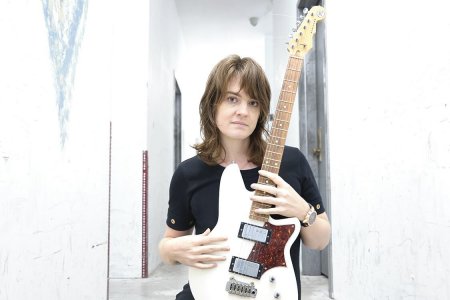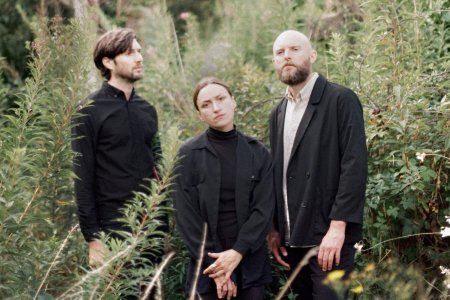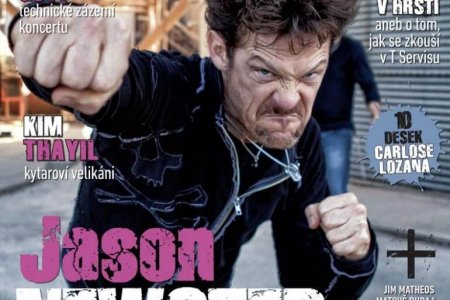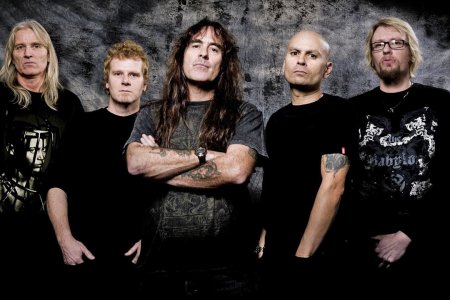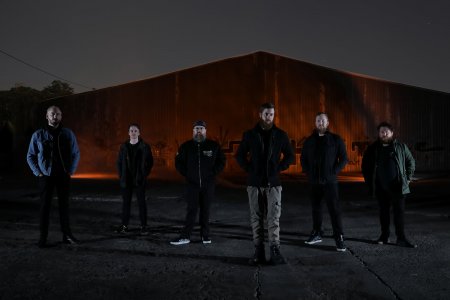On February 13th 2020 it was fifty years since the release of a legendary debut album of Black Sabbath. If anyone wanted to release a tribute to this album, it was an ideal time. Zakk Wylde, practically an adopted son of Ozzy Osbourne, recorded the whole debut in his typical sound and released it under the name Zakk Sabbath. Next long term partner of Ozzy, as well as Black Sabbath, Adam Wakeman approached the early tracks of Black Sabbath in a jazz style and named it symbolically Jazz Sabbath. The son of a famous father had to face doubts from his own blood and next to it, he packed the whole thing in a story where these tracks were apparently stolen from a fictional figure Milton Keynes, after he felt into a coma, by some guys from Birmingham. We had a great chat with Adam about the creation of the whole concept, writing of the album, as well as recording of a great documentary with many top class guests.
Also there are a few answers from Milton Keynes…
This interview originally came out in December 2020 issue of Czech magazine Muzikus.
Full version in Czech here.
The album has an ideal beginning with Fairies Wear Boots, which shows what a listener can expect throughout the whole album. It also has an ideal tempo for a first track. Joe Bonamassa once told me: „Soup and starters are an obligation. Powerful track is an ideal intro of an album.“
I am hearing this sort of interpretation for the first time, but I like it. The whole writing process and then choosing the right order of the tracks was a quite diverse process. Iron Man was the first one that I played and did the arrangement for. And then I basically just tried lots of different Sabbath songs. And if nothing came naturally in the first couple of plays, I shelved it, put it to one side and moved on. Because I didn’t want anything to seem like I was trying too hard to make it work. So that’s why these were the first seven songs that really felt like they lend themselves to the style of jazz that I was kind of arranging. And why Fairies Wear Boots ended up at the start? It was purely once I’ve recorded all seven songs, I always knew Children of the Grave is going to be the last track. But the first set was kind of a lottery. I listened to the different orders for lots of hours. And, you know, that just seemed to be the one that stuck for the first track.
Children of the Grave provides very powerful finale and it fits at the end. It seems you had a very clear vision about the beginning and the end.
Yeah, definitely! There were people that I really wanted to get involved and just take a solo. And then it was just a case of, you know, who goes where. So when I did the arrangement, I kind of left, you know, eight bars or sixteen bars for each person. And it just builds and builds. And it was great. I think everybody’s got a pseudonym. So you don’t know who’s playing on which track as the guest. So that’s kind of a nice touch to it.
I can imagine some of your wildest ideas were hidden in your mind for decades, fifteen years at least.
Yeah, well, it’s taken a long time to do this. This whole idea happened in 2013, seven years ago when I was in Berlin on a Sabbath 13 tour. And I had been out for some drinks with some friends and I met up with one of Sabbath’s security guards, who I met in the bar at the hotel. And there was no one else in there. So I just sat at the piano. And I just thought it would be funny to play through the Sabbath setlist in a kind of drunk jazz style. Just to amuse myself really. And then I went to bed that night thinking, wouldn’t it be funny if somebody had actually thought they’d written all the songs, and then that started to develop the character of Milton Keynes and the whole story. So it’s been a project in progress for quite some time, although I haven’t told anybody about it. You know, for six of those years, I just wanted to get the documentary written, I wanted to make sure the album works. The most important thing, you know, as far as the documentary was, which I really enjoyed doing, It’s about the music and if the music’s rubbish, then it was a waste of time.
Absolutely. I heard this fact a couple of times from the guys from Dream Theater and read it in studies from Berkeley university: “First has to be the quality music and then you can be creative with marketing.”
I grew up in an era where music business was a lot more business music. In the 70s you could get away with getting drunk and doing a relatively average gig. It wasn’t filmed and placed on YouTube by the end of the night. People judging you that weren’t even there. We are now in an era where, you know, it is about music professionalism and the professionalism of musicians. Standards are now very high and they should be. The good thing is that when you’re on these kind of tours, you’ve had a good rehearsal, you know your craft and you can learn stuff quickly, it doesn’t take long before you can start doing something more.

I just thought it would be funny to play through the Sabbath setlist in a kind of drunk jazz style.
Just to amuse myself really.
Wakeman & Wakeman
Throughout the years I believe you exchanged with your father many tips on interesting jazz albums. However, were there some which you love, but your father doesn’t?
Well, my dad isn’t a big fan of jazz. When I spoke to him originally about this idea, he thought it was a terrible idea. He said, no one’s gonna be interested. I always listen to my dad’s advice. And I pretty much always do the opposite. That’s just the teenager in me just hanging on in there. But he didn’t really kind of play much music around the house. My parents separated when I was quite young so I saw my dad on the weekend. And that was the time to go play football or, you know, go and do other stuff. So we never really sat down, played music together or listen to other music. So it was actually my stepfather, who sort of turned me on to different types of music. He turned me on to Dr. John, who was my favorite. He’s my ultimate hero. So I mean, I’d like to think there’s a little bit of him in what I do when it comes to jazz. And Thelonious Monk obviously, who was a huge jazz pianist influence, although I don’t claim to play anything like him. But I loved listening to tracks of his when I was a bit younger. What I think the closest to the style that I was looking at is between Dr. John and a guy called Monty Alexander, who I really liked. He is great and I believe, he is a Jamaican pianist. I’ve only had a couple of albums of his. And there’s one called Yard Movement, which was excellent. And that’s kind of it really, within my jazz influences. There is not a great deal of it. I still think of myself, somebody is gonna go: “Hold on a minute. This is all rubbish!” But I enjoy doing it. And I enjoy listening to it, which is, you know, that’s the kind of the past mark for me. If I can sit down and listen to it without being too critical, then I know I’ve hopefully done a good enough job.
I am glad you mentioned Dr. John, because three days ago I spoke about him with Blues Pills’ singer Elin Larsson. When I saw his picture, I remembered him, but to be honest, I properly checked his music a few days ago. There are always things to discover.
I think he’s the only artist I’ve ever asked for an autograph. I’ve been pretty lucky to meet many heroes of mine, especially Jimmy Page and Robert Plant. But I’ve had no inclination to have an autograph. But because Dr. John was such an influence on me as a youngster, I went to see him with my stepfather in Canada. It must have been 25 years ago or maybe even longer. But he was in a really bad shape. The concert was great though. It was just him and a piano. I think he was out of rehab and he was really struggling. And I queued up afterwards to get his autograph for his autobiography. The bouncer was saying: “No, he already left”. And I said, no, no, he hasn’t left unless he’s climbed out of a window because in this particular venue, I knew where the dressing room was. And I said he hasn’t come down. So I said, I’m gonna wait. So, I was the only one waiting and I waited for about an hour and a half and eventually he did come out and sign my book to me. Which I then led to somebody who then lost it. So the one autograph I ever wanted is gone. (Laugh)
Courage To Experiment
Your story just perfectly reminded me of Bruce Dickinson going for a show of Arthur Brown. He was talking how he met his idol in a documentary series called Metal Evolution – episode about Shock Rock. So if I can kindly ask you to pick a couple of your most favorite documentaries, which in some way might have influenced you or gave you some clue how to arrange your documentary about Jazz Sabbath?
Well, I think the obvious choice would be Spinal Tap. I love the music and the seriousness that goes along with it. But I think when you add comedy to something it works. It’s two of my most favorite things: Comedy and music. They go together, as long as you’re not making a joke out of the music. Spinal Tap has great music, great acting, and a great documentary. And that was one of the things I wanted to emulate a little bit. And hopefully I kind of achieved a small step in the right direction. But other than that from a serious kind of documentaries… I don’t really watch a great deal of music documentaries. I did see one about Dave Matthews which I love. The way it was shot with a mix of live and interviews. I also watched one about Suede actually. That was excellent. And I think that was good because the guitar player Bernard Butler was not featured in it. That made the documentary even better, the fact that he wasn’t in it. You are always wondering whether he was going to show up at the end. They made a fantastic documentary because it would have been good if he was in it, but it was better because there was just this added suspense of mystery which I really liked. Maybe in the next documentary I’ll try and do that. (Laugh) I’m currently trying to find commissioning. I’ve written a series, a short comedy series following Milton Keynes for a television.
Good luck with that and if I can give you my two tips on documentaries, it would be first of all Genesis – Together and Apart even though they ignored solo career of Steve Hackett, Ryan Wilson phase and just shortly mentioned Selling England by the Pound. The second one would be Marvin Gaye – What’s Going On. I must have seen both of them at least a dozen times. They have such a great structure, you could make a parody out of it and there are so many guests, you cannot believe it. I had the same feeling with your documentary.
You know what my dad said: “No one is gonna do that, but I will come. You won’t get people to do it.” I had probably another fifteen musicians and artists that I just couldn’t schedule in as they were too busy, or they weren’t in the country, or I couldn’t get somebody to film them. There are a lot more people that wanted to be in it. And we cut a few out for various reasons. But it was great. I mean, I was really surprised. And it just shows, if you don’t ask, you don’t know. I mean, it’s crazy that filming days were leading up to Christmas. It was really, really busy. I was working on session for gigs and things and then it all kind of happened really quickly. Robert Powell was available on this day. So I booked a studio in London and I’ve got hold of the camera guys and sound guys. It was very stressful, as we had to arrange our schedules, as I had a gig coming up. The evening before I was up till maybe three in the morning, just finalizing the script for Robert. And it wasn’t until I drove to my gig that night, about five or six o’clock in the evening – I just realized how ridiculous it was that I just spent a day with such an amazing actor like Robert Powell. And there’s me pretending to be an actor, it was just the most surreal thing, which I guess that because it happened so everything’s so busy and didn’t have time to worry about it. Like everybody does when they’re doing something out of their comfort zone. Acting to me isn’t a natural phase or something I’ve done a lot of. So, you know, to be put with an award winning British actor was quite intensive. It should have been quite frightening, but because I just haven’t had time to panic, it was actually just a really fun experience.
I’m also wondering if there was some long term friend of yours who could give you some bits and pieces of advice?
Well, the one person I would have asked for advice would have been Robert Powell. I might have known him for probably 25 years now. And he’s such a lovely man. Such a generous man with his time. He was politely pointing things out as we were going through the day. Just sharing a little bit of knowledge, but without making me feel like I didn’t know what I was doing. Which is so sweet. It’s such a kind of a guided way of doing it. But yeah, I mean, he would have been the person I’d speak to. The thing with the character, because it’d been going on for so long, I could visualize exactly how each scene was going to play out. I knew the script inside outside, I kind of fell into that character. Once I got the make-up on, I felt very comfortable.

When I spoke to my dad bout this idea, he thought it was a terrible idea.
As this interview will be also released in Czech gear oriented magazine Muzikus, could you please mention some of the items, within gear, you relied on during the writing of the album?
The piano was recorded on a Kawai K300 upright piano which I have in my studio at home. I recorded a template arrangement on Logic first, which I then sent to Asho Soan in Norfolk to record drums on from his studio, and then the same for Jerry Meehan to record from his studio in Kent. I spent a long time writing the arrangements and the dynamics so that when it came to the other guys recording their parts, it was clear where to rise and fall dynamically. Once those parts were back to me, I recorded the piano using a matching pair of 2 Rode NT5 condenser mics.
Coming towards the end of our time, I’m just wondering, if you made some friendly exchange with Zakk Wylde? Did you give him feedback on his project Zakk Sabbath and if he give you for yours?
Leading up to the recording, I was trying to get Zakk and Blasko on the documentary, but it was so frustrating, because every time we had time, they didn’t have time. And it just never happened, which was such a shame because I’d love to get them on that. To be honest, I’m not sure if he’s heard it yet. I know Blasko said he liked it and I expect he’s played it to Zakk. I did get a very nice message from Ozzy the other day, which was fantastic. Because I know Geezer had heard it and he liked it. And I also got a message from Bill Ward as well. Three out of four said that they are happy with it.
That’s awesome. So how is Bill?
Yeah, well, I spoke to him through a mutual friend of ours – Walter, who was his assistant for many, many years. I didn’t have a direct contact with Bill. I spoke with him back in 2007. No, wait, I did a session and played on an album that he was making. Probably in around 2010. That was the last time I sort of seen him. But yeah, I sent a copy to Walter who passed it on to Bill and then I got a message back by Walter saying that he enjoyed it.
Hopefully Bill is alright.
Yeah, me too. I haven’t seen him for a few years unfortunately.
Thank you for a great chat. Have a nice evening.
Yeah, thank you and we’ll catch up again soon.
All right. Cheers.
Cheers. Bye.

Bonus: A short chat with Milton Keynes
How do you believe Black Sabbath were able to write other tracks, they didn’t hear from you on their early albums?
Geezer was seen at a lot of my early gigs writing things down on the back of a cigarette packet and beer mats. I believe that this was the start of the theft of my music. I think he wrote all the chord changes down whilst pretending to be enjoying my music at the concerts.
Do you believe they took you as a big inspiration also for their future albums? Personally, I have a few favorites on Technical Ecstasy and Never Say Die, but only few. No wonder this t-shirt was created. I believe they managed to stay on the market for so long thanks to you Milton and by bringing later on amazing talents as Ronnie James Dio, Tony Martin and Vinnie Appice etc. to help with writing.
I believe that once I had been removed from the music scene, that Black Sabbath could no longer create similar work to what they stole from us. Indeed, they tried by hiring new singers and writers, but clearly the writing was never as good. Although, yes, technically they were around for over 50 years and made multiple millions of pounds each. But it’s not about the money…

